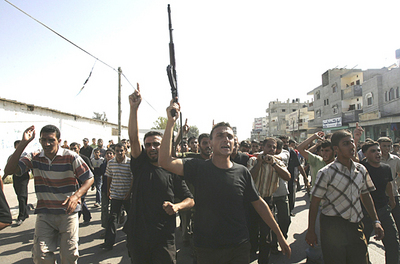
Amjad Atallah co-directs the New America Foundation/Middle East Task Force.
This past Friday, Hamas engaged in an intense battle with a Salafist group called Jund Ansar Allah (the Soldiers of the Supporters of God). The instigation for the battle came after the leader of the group, Abdul Latif Musa, gave a Friday sermon calling for the immediate implementation of an “Islamic emirate” in the Gaza Strip and for a Taliban-like Salafist version of Shariah (or Islamic law) to be imposed.
Hamas didn’t wait. Before his sermon was over, al-Jazeera reported that Hamas police surrounded the mosque and demanded the surrender of Musa and his supporters. The ensuing gun battle left at least 28 dead, including six Hamas police and six civilians including an 11-year old girl, and over 100 wounded. Musa died, according to Hamas, when he blew himself up rather than surrender to the police.
For years, analysts without a stake in supporting either Fatah or Hamas, or Likud or Kadima, including leading former American statesmen, have argued that the Bush-era policy of blockading the Gaza Strip, starving the population, and supporting Israeli attacks on the Strip instead of maintaining a cease-fire, was morally incoherent, illegal under international law, and tactically counter-productive. Even as Somalia became a case study for what one shouldn’t do, the Bush team couldn’t help but hope that what failed in one place might succeed in another.
Just as a reminder, an Islamist group called the Islamic Courts Union (ICU) took over Mogadishu and much of Somalia after years of international inaction and began establishing law and order. Checkpoints were shut down, the airport and seaport were opened, and Somalis in the Diaspora began returning to see how they could help rebuild their failed state.
Rather than engage the ICU and attempt to moderate any potential Salafist tendencies, the US “encouraged” Ethiopia to invade Somalia, fatally weakening the ICU, and simultaneously opening the door to outright chaos and the rise of a Salafist group called the Shabab, leaving western countries to scramble to find ICU leaders with whom they can still work. Piracy off the Horn became a common phenomenon.
Hamas has been more successful than the ICU because Israel has been less successful than Ethiopia. The repeated attempts to overthrow Hamas, which took over the Palestinian Authority in the 2006 elections in the Occupied Territory, have weakened but not bowed Hamas. However, the alternative in Gaza has not been the secular Fatah, but Salafist groups.
The vigor with which Hamas is responding to this challenge (perhaps too vigorous), ironically, would be difficult, if not impossible, by the US-trained Palestinian forces under General Dayton’s instruction in the West Bank. This is not because of any lack of ability, but because of a limit on legitimacy imposed by its cooperation with Israel within the context of the on-going Israeli occupation.
Hamas police are viewed as bringing law and order AND resisting Israel. The West Bank police can only do the former and actually must stand by impotently when Israel conducts raids in the West Bank including in Ramallah, a source of constant complaint to the US government by our Palestinian friends in Ramallah.
This points to a much larger point for US-Middle East strategy. The best forces to counter Salafist ideology, including misogyny, bigotry, and support for violence against civilians, comes not from US military pressure, but from potential alliances with more moderate nationalist Islamist groups which have legitimacy within their own communities. Hamas leader Ismail Haniyeh’s attack on Musa, the leader of the Salafist group, has more resonance on Muslims in the Gaza Strip than an Israeli attack on the mosque, which would have undoubtedly strengthened support for the group.
Fatah, in this sense, is a unique exception, as it remains the only popular based secular nationalist movement left in the Arab world. However, as long as its policy of negotiating with Israel and administering small parts of the occupied territory does not translate into freedom and independence for Palestinians, it will continue to be hamstrung by its tether to the occupation forces. Anyone who thinks that Fatah will get credit for small economic improvements in Palestinian eyes while the occupation continues should google news stories from the 1990s.
This incident shows more than ever the danger to the Obama administration’s goals of a comprehensive regional peace if it continues any of the Bush-era policies in the region, whether in attempting to manage the Israeli occupation with incremental improvements, continuing a blockade on the Gaza Strip, or expecting war to result in peace agreements. It is clear that President Obama disagrees in principle with these approaches, but the policies on the ground have yet to catch up.
As we all so heartily chanted during the US presidential elections, “It’s time for a change.” Hamas actions on Friday should prompt an internal review of US policy toward Palestinian unity. There should be a prompt reconsideration of whether the international community cannot follow the lead of peace groups and open the Gaza Strip from the sea, in cooperation with a technocratic unity Palestinian government, to relieve the assault on the civilian population that has bred Salafist extremism. This would de-couple US policy in the region from Likud’s intransigence far more than our months long negotiation with Netanyahu on a settlement freeze.
Simultaneously, there should be a broader reconsideration of how and when the US can find common cause with nationalist Islamist groups willing to condemn violence against civilians to promote long term US goals for the region.
— Amjad Atallah


25 comments on “Guest Post by Amjad Atallah: Hamas vs. the Fundamentalists”